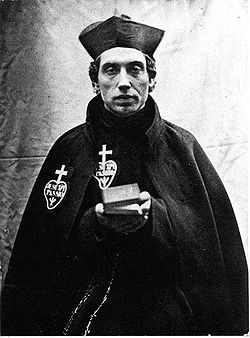Charles of Mount Argus
| St. Charles of Mount Argus, C.P. | |
|---|---|

Father Charles of St. Andrew wearing the Passionist habit (1851)
|
|
| Religious and priest | |
| Born | 11 December 1821 Munstergeleen, Limburg, United Kingdom of the Netherlands |
| Died | 5 January 1893 Mount Argus Monastery, Harold's Cross, Dublin |
| Venerated in |
Roman Catholic Church (Passionists and Ireland) |
| Beatified | 16 October 1988, Saint Peter's Basilica, Vatican City by Pope John Paul II |
| Canonized | 3 June 2007, Saint Peter's Basilica, Vatican City by Pope Benedict XVI |
| Major shrine | Mount Argus Monastery, Harold's Cross, Dublin, Ireland |
| Feast | January 5 |
Charles of Mount Argus, C.P. (11 December 1821 – January 1893), was a Dutch Passionist priest who served in 19th-century Ireland. He gained a reputation for his compassion for the sick and those in need of guidance. His reputation for healings was so great at the time that a reference is made to him in the famous novel Ulysses by James Joyce. He has been canonized by the Catholic Church. His feast day is January 5.
He was born Joannes Andreas Houben on 11 December 1821 in the village of Munstergeleen in the Province of Limburg in the Kingdom of the Netherlands, to Peter Joseph Houben and his wife, Johanna Elizabeth Luyten. He was named after his maternal uncle and godfather, but to the family he was known as Andrew. His father was a miller by trade. As a boy Andrew attended the village primary school. One of 11 children in a poor family, he was a slow learner in his youth. To those outside his family he seemed quiet and extremely shy. A slow learner, for ten years he walked the two miles to a secondary school at nearby town of Sittard.
When Houben was 19 years old he was enrolled for military service in the First Infantry Regiment of the Netherlands. It is said that on occasion during his time as a soldier there was a disturbance in the town; the army were called out and ordered to fire. Afraid that he might hit someone, Andrew pointed his rifle the wrong way and narrowly missed shooting his superior officer. On 18 February 1845 his period as a reserve in the army came to an end and he was formally discharged.
Feeling called to religious life, in 1845 Houben was admitted to the novitiate of the Passionists, who had recently arrived in Belgium, in the village of Ere, near Tournai. He professed his religious vows the following year and was given the religious habit and the religious name of Charles of St. Andrew. His father died in 1850, just before Charles' ordination as a priest. The family were so poor they could not afford to go to his ordination because of the expenses of the funeral. Even happy days were lonely days. He was sent to serve in England in 1852. He did parochial ministry in the Parish of St. Wilfred and neighboring areas. Serving there, Charles first came in contact with the Irish who were moving to England in the wake of the devastating famine taking place there.
...
Wikipedia
